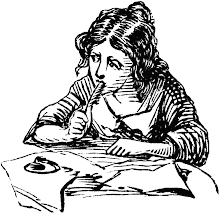
When writing a story of any kind, it is always a good idea to create an outline to keep your thoughts in order. Until recently I was not using such an organized method but after reading about this suggestion in
How to Write and Sell Historical Fiction I have come to the conclusion that it is absolutely necessary.
For instance: The dog ran away from home. I know that the dog ends up with a little girl with pig tails. I don't however, know what the dog does until he is found by the little girl. So, where can you write down that you know the little girl will find the dog while you work on the meat of the story? The answer is an outline.
Example:
I. Dog runs away from home
II. Dog sleeps in park
III. Dog tries to find food
A. Baker throws dog scraps
B. Dog looks in garbage cans
IV. Little girl finds dog
A. Little girl puts up flyers for lost dog








No comments:
Post a Comment